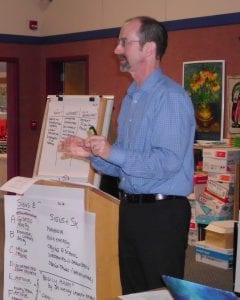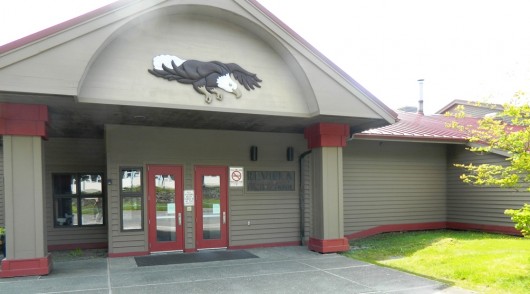A class to help adults recognize and respond to mental health problems in youth took place in Ketchikan April 30th and May 1st.
About 30 people attended the Youth Mental Health First Aid Class held at Revilla Alternative School. Wendi Shackelford works with the University of Alaska Anchorage Center for Human Development. She co-led the first day of training.
“And what that is, in a nutshell, is an 8-hour training for any adults, 18 or older, who want to increase their noticing skills, to think about how they have conversations with young people before things get so bad that situations happen.”
Shackelford says the training helps people become aware of risk factors, signs and symptoms of emerging mental health issues.
“And how to have conversations around those without feeling fear or dread. And just feeling like I have some competency as an adult in coming alongside a young person who is experiencing crisis or emerging mental health (issues).”
Police officers, school staff, counselors, mental health professionals and staff of the Department of Juvenile Justice attended the two-day class.
The second day focused on suicide prevention and intervention. It was led by UAA training coordinator Eric Boyer. Part of the training is introduction to a peer-led program called “You Are Not Alone.”

Eric Boyer of the UAA Center for Human Development speaks during a youth mental health training session at Revilla Alternative School (KRBD staff photo by Maria Dudzak).
“Where the kids actually become part of the network to teach their peers about what suicide looks like and that it’s okay to get help or to accept help. And then how to support their peers to get help from a safe adult that they know in the school, at home, in the community, at church, wherever they like to hang out.”
Boyer says teens want to be part of the solution.
“And that entails giving them the skills so that they can feel like they have hope, that they can help support each other, and that it’s really important to have safe adults in their lives that they can go to when somebody is struggling with life, wanting to live or not.”
Boyer says everyone can play a role in suicide prevention by knowing the facts, and assisting at a community level.
“It’s great to have professionals and hospitals that do some of the work, but the majority of the people out there…they get the help from you and I. Somebody that is in close proximity who can just reach out and say, ‘Hey, you know. I don’t see exactly what you’re going through but I want to support you and be here to help you.”
Shackelford says people often don’t intervene because they don’t know what to say or do.
“The Youth Mental Health First Aid and QPR really help people think differently about that and helping them feel more competent and how to ask, how to notice and maybe what to do should that situation come across them.”
QPR stands for question, persuade and refer, a technique used in suicide prevention.
Kurt Lindemann is principal at Revilla Alternative School. He says the entire Revilla staff attended the first day of training.
“It’s a big enough deal that I think it’s important that the whole staff gets an opportunity to get that training, and it’ll be something that we’ll use as we deal with kids that are in tough situations – crisis situations is the idea behind it.”
Shackelford and Boyer say they brought the training to schools throughout the state. More information about training and suicide prevention is available through the UAA Center of Development. There is also a state-wide, confidential helpline – 877-266-HELP.
___________________________________________________________
CarelineAlaska – http://carelinealaska.com/
877-266- HELP (4357)
Alaska Training Cooperative (to learn about upcoming classes or request one) – https://aktclms.org/Training/Class/101383?bbid=2
National Youth Mental Health First Aid training information – https://www.mentalhealthfirstaid.org/take-a-course/course-types/youth/






